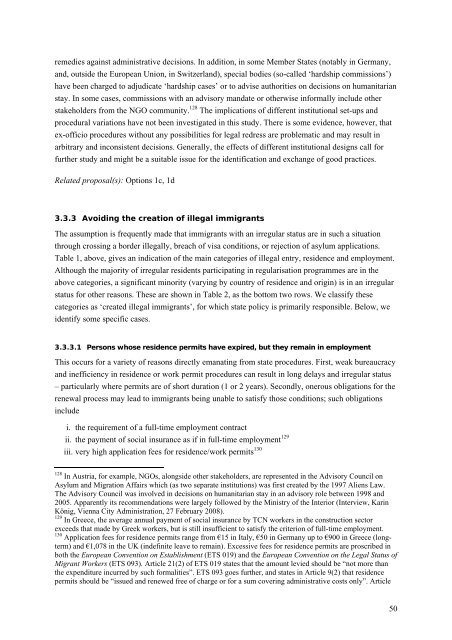REGINE Regularisations in Europe Final Report - European ...
REGINE Regularisations in Europe Final Report - European ...
REGINE Regularisations in Europe Final Report - European ...
Create successful ePaper yourself
Turn your PDF publications into a flip-book with our unique Google optimized e-Paper software.
emedies aga<strong>in</strong>st adm<strong>in</strong>istrative decisions. In addition, <strong>in</strong> some Member States (notably <strong>in</strong> Germany,<br />
and, outside the <strong>Europe</strong>an Union, <strong>in</strong> Switzerland), special bodies (so-called ‘hardship commissions’)<br />
have been charged to adjudicate ‘hardship cases’ or to advise authorities on decisions on humanitarian<br />
stay. In some cases, commissions with an advisory mandate or otherwise <strong>in</strong>formally <strong>in</strong>clude other<br />
stakeholders from the NGO community. 128 The implications of different <strong>in</strong>stitutional set-ups and<br />
procedural variations have not been <strong>in</strong>vestigated <strong>in</strong> this study. There is some evidence, however, that<br />
ex-officio procedures without any possibilities for legal redress are problematic and may result <strong>in</strong><br />
arbitrary and <strong>in</strong>consistent decisions. Generally, the effects of different <strong>in</strong>stitutional designs call for<br />
further study and might be a suitable issue for the identification and exchange of good practices.<br />
Related proposal(s): Options 1c, 1d<br />
3.3.3 Avoid<strong>in</strong>g the creation of illegal immigrants<br />
The assumption is frequently made that immigrants with an irregular status are <strong>in</strong> such a situation<br />
through cross<strong>in</strong>g a border illegally, breach of visa conditions, or rejection of asylum applications.<br />
Table 1, above, gives an <strong>in</strong>dication of the ma<strong>in</strong> categories of illegal entry, residence and employment.<br />
Although the majority of irregular residents participat<strong>in</strong>g <strong>in</strong> regularisation programmes are <strong>in</strong> the<br />
above categories, a significant m<strong>in</strong>ority (vary<strong>in</strong>g by country of residence and orig<strong>in</strong>) is <strong>in</strong> an irregular<br />
status for other reasons. These are shown <strong>in</strong> Table 2, as the bottom two rows. We classify these<br />
categories as ‘created illegal immigrants’, for which state policy is primarily responsible. Below, we<br />
identify some specific cases.<br />
3.3.3.1 Persons whose residence permits have expired, but they rema<strong>in</strong> <strong>in</strong> employment<br />
This occurs for a variety of reasons directly emanat<strong>in</strong>g from state procedures. First, weak bureaucracy<br />
and <strong>in</strong>efficiency <strong>in</strong> residence or work permit procedures can result <strong>in</strong> long delays and irregular status<br />
– particularly where permits are of short duration (1 or 2 years). Secondly, onerous obligations for the<br />
renewal process may lead to immigrants be<strong>in</strong>g unable to satisfy those conditions; such obligations<br />
<strong>in</strong>clude<br />
i. the requirement of a full-time employment contract<br />
ii. the payment of social <strong>in</strong>surance as if <strong>in</strong> full-time employment 129<br />
iii. very high application fees for residence/work permits 130<br />
128 In Austria, for example, NGOs, alongside other stakeholders, are represented <strong>in</strong> the Advisory Council on<br />
Asylum and Migration Affairs which (as two separate <strong>in</strong>stitutions) was first created by the 1997 Aliens Law.<br />
The Advisory Council was <strong>in</strong>volved <strong>in</strong> decisions on humanitarian stay <strong>in</strong> an advisory role between 1998 and<br />
2005. Apparently its recommendations were largely followed by the M<strong>in</strong>istry of the Interior (Interview, Kar<strong>in</strong><br />
König, Vienna City Adm<strong>in</strong>istration, 27 February 2008).<br />
129 In Greece, the average annual payment of social <strong>in</strong>surance by TCN workers <strong>in</strong> the construction sector<br />
exceeds that made by Greek workers, but is still <strong>in</strong>sufficient to satisfy the criterion of full-time employment.<br />
130 Application fees for residence permits range from €15 <strong>in</strong> Italy, €50 <strong>in</strong> Germany up to €900 <strong>in</strong> Greece (longterm)<br />
and €1,078 <strong>in</strong> the UK (<strong>in</strong>def<strong>in</strong>ite leave to rema<strong>in</strong>). Excessive fees for residence permits are proscribed <strong>in</strong><br />
both the <strong>Europe</strong>an Convention on Establishment (ETS 019) and the <strong>Europe</strong>an Convention on the Legal Status of<br />
Migrant Workers (ETS 093). Article 21(2) of ETS 019 states that the amount levied should be “not more than<br />
the expenditure <strong>in</strong>curred by such formalities”. ETS 093 goes further, and states <strong>in</strong> Article 9(2) that residence<br />
permits should be “issued and renewed free of charge or for a sum cover<strong>in</strong>g adm<strong>in</strong>istrative costs only”. Article<br />
50
















